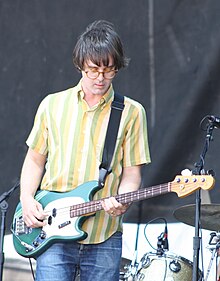Loading AI tools
Musical artist From Wikipedia, the free encyclopedia
Michael Andrews (born November 17, 1967), also known as Elgin Park, is an American multi-instrumental musician, producer, and film score composer. He is best known for a cover version of the Tears for Fears song "Mad World", which he recorded with Gary Jules for the Donnie Darko soundtrack, and which became the 2003 UK Christmas number one.[1] He is a founding member of the San Diego soul-jazz band The Greyboy Allstars, where he goes by the moniker Elgin Park.[2]
Michael Andrews | |
|---|---|
 Andrews in 2012 | |
| Background information | |
| Also known as | Mike Andrews, Elgin Park |
| Born | November 17, 1967 |
| Origin | San Diego, California |
| Genres | Film score, experimental, folk |
| Occupation(s) | Musician, composer |
| Instrument(s) | Guitar, piano, keyboards, bass guitar, marimba, drums |
| Years active | 1985 - present |
| Labels | Avace, Ever Loving |
After joining The Greyboy Allstars following the dissolution of his band The Origin, Andrews fell into film score composition by chance in 1998 when The Greyboy Allstars were asked to score Jake Kasdan's first feature Zero Effect and worked on the music for the highly regarded (though short-lived) TV series, Freaks and Geeks. In 2000, Richard Kelly commissioned him to do the soundtrack for the film Donnie Darko. Its original score album went on to sell over 100,000 copies (in part because of Andrews's remake of Tears for Fears' "Mad World", featuring Gary Jules),[3] and Andrews became a composer to watch. He has since gone on to compose scores for the movies Out Cold, Nothing, Cypher, Orange County, My Suicidal Sweetheart, Me and You and Everyone We Know, The TV Set, a segment of Paris, je t'aime, Unaccompanied Minors, Bridesmaids, Walk Hard: The Dewey Cox Story and Daddy's Home among others.
In early 2000, Jim Juvonen gave Andrews a copy of the script for the as-yet-unmade feature film Donnie Darko. Director Richard Kelly knew Andrews worked with The Greyboy Allstars, and made music under the name Elgin Park.
Like his role models John Barry and Ennio Morricone, Andrews wanted a song on his otherwise instrumental score. He chose "Mad World" by Tears for Fears (originally released in 1982), which his childhood friend Gary Jules sang as Andrews played piano.
The first soundtrack record was released by Andy Factor, a friend of Andrews, through his Everloving Records label in 2002. As Donnie Darko was not a hit at first, there was little interest in the soundtrack in the US. The film was more popular in Europe, especially in the UK, where it outgrossed the US release.
This sparked interest in the soundtrack and "Mad World", which was a 2003 Christmas #1 on the UK Singles Chart. It reached the top 30 of the American Billboard Modern Rock chart in 2004 and hit #1 on the Canadian Digital Singles chart in January 2007.[3] It charted in countries like Ireland, Denmark, the Netherlands, and Australia in 2003 and 2004, and a snippet was used in the television commercial for the 2006 Xbox 360 video game Gears of War.
In 2005, Andrews scored Me and You and Everyone We Know, a film by Miranda July praised at both Sundance and Cannes film festivals. The score to the film was released on Everloving Records on July 12, 2005.
Initially taking cues from the characters' dialogue, Andrews began writing the score. He came to understand the film's world as a kind of alternate reality where people believe in fate and chance—and this was the world he needed to paint with his music. He also saw the feelings July was trying to get across in her film as very primary. "She tries to break things down to very basic, simple shapes—the simplest shapes possible, and that totally influenced me in my music".

Working out of his custom-built backyard studio in Glendale, California, Andrews spent three months creating the score using an orchestra of obscure vintage synthesizers (a miniature hotwired Casio keyboard was unearthed at a garage sale for $10) and drum machines. His concept was to play what he termed amateurish, emotional, naïve, magical and simple music on highly unemotional, inorganic instruments—for example, a calculator with built-in twelve-note keyboard that lends a haunting portamento melody to one of the film's motifs.
Other instruments used in the score include Andrews's modified piano (rather than hitting the strings directly, the hammers first make contact with a piece of soft felt, creating a warmer, slightly muffled tone), as well as his Moog and Vocoder synthesizers. Despite all the electronic gear, no MIDI was used in the recording, so that all the humanness, all the subtle variations of rhythm, are intact. Inara George adds vocals in several climactic moments throughout the film. In some cases, cues were composed of only two or three tracks in order to attain the magical simplicity for which the film called out.
Andrews released his first solo album, Hand on String, on his own newly established label, Elgin Park Recordings, in summer 2006. He is credited on the album as Mike Andrews.
In August 2012, Andrews's second solo record, "Spilling A Rainbow", was released on Everloving Records performed mostly alone, and with Dan Long and Steve Kaye recording.[4]
Seamless Wikipedia browsing. On steroids.
Every time you click a link to Wikipedia, Wiktionary or Wikiquote in your browser's search results, it will show the modern Wikiwand interface.
Wikiwand extension is a five stars, simple, with minimum permission required to keep your browsing private, safe and transparent.